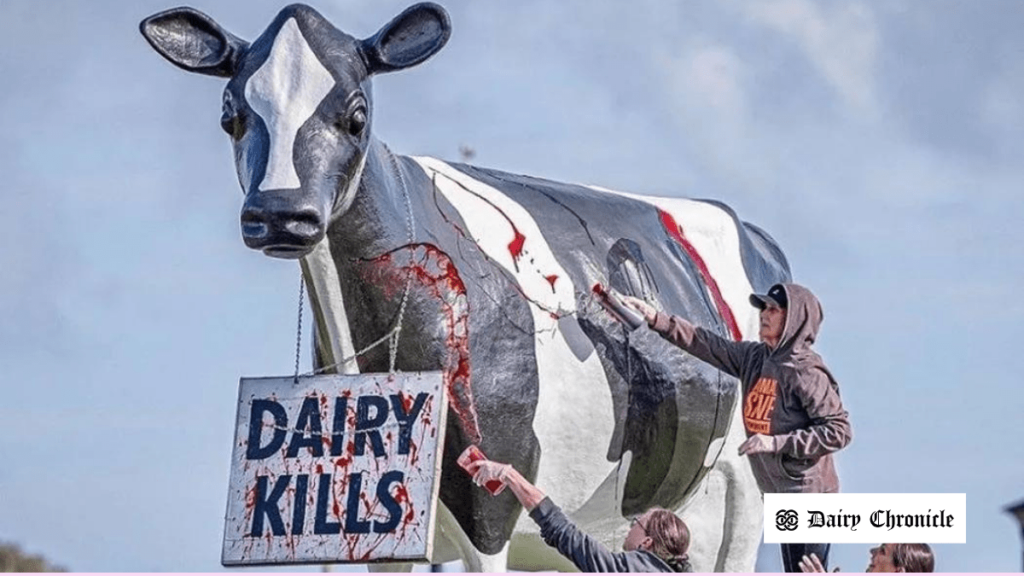Activists from Taranaki Animal Save and Climate Justice protested at Fonterra’s Whareroa plant in Taranaki, New Zealand, by covering an iconic cow statue with red paint and hanging a “dairy kills” sign. The protest aimed to raise awareness about the treatment of bobby calves in the dairy industry. Fonterra, New Zealand’s largest dairy company, defended its practices, emphasizing animal welfare and sustainable farming. The activists are calling for a reduction in dairy consumption in favor of plant-based alternatives.
In Taranaki, New Zealand, animal rights activists made a dramatic statement at Fonterra’s Whareroa plant by covering the iconic cow statue with red paint and hanging a “dairy kills” sign around its neck. The protest, organized by Taranaki Animal Save, coincided with Bobby Calf Awareness Day and aimed to raise awareness about the treatment of bobby calves in the dairy industry.
The Protest and Its Message
Taranaki Animal Save, a local animal rights group, spearheaded the protest to provoke a discussion about the ethical concerns surrounding bobby calves—young calves that are often slaughtered soon after birth if not needed for herd replacement. Elin Arbez, spokesperson for Taranaki Animal Save, explained that the action was meant to shed light on the hidden realities of dairy production.
“Despite dairy consumption being ubiquitous in our culture, the grim and deadly truth behind its production remains largely shrouded from public view,” Arbez stated. She referred to a 2017 Horizon survey that revealed half of the New Zealanders surveyed did not know a cow must give birth to produce milk. Moreover, over 80 percent underestimated the number of bobby calves killed each year, and 60 percent found the practice of killing four-day-old calves unacceptable.
Fonterra’s Response
Fonterra, headquartered in Auckland, New Zealand, is the largest dairy company in the country and a significant player in the global dairy market. The company, known for its high standards and commitment to sustainable farming, has faced criticism from animal rights groups over its handling of bobby calves.
In response to the protest, Fonterra reiterated its commitment to animal welfare. “Fonterra farmers must ensure all non-replacement calves enter a value stream—either beef, calf-veal (bobby), or pet food. Calves are only euthanised on-farm when there are humane reasons for doing so,” stated a company representative. This statement highlights Fonterra’s efforts to align with ethical practices and maintain the integrity of its farming processes.
Criticism from Climate Justice Taranaki
Climate Justice Taranaki, another local organization, also criticized Fonterra and the dairy industry’s practices. Tuhi-Ao Bailey, spokesperson for the group, pointed out that 95 percent of New Zealand’s dairy products are exported, primarily as dehydrated milk powder for processed foods. “The processes for forcing impregnation of cows, removing calves from their mothers, and slaughtering them within days is dripping in violence and abuse,” Bailey said.
Climate Justice Taranaki advocates for more sustainable and ethical environmental practices, criticizing the dairy industry’s environmental footprint and the treatment of animals. Their stance adds another layer to the ongoing debate over the ethics of industrial dairy farming in New Zealand.
The Call for Change
Both Taranaki Animal Save and Climate Justice Taranaki are urging a shift in consumer behavior. They advocate for reducing or eliminating dairy consumption in favor of plant-based alternatives, such as fruits, vegetables, nuts, and grains. These groups argue that such a transition is crucial not only for animal welfare but also for environmental sustainability and public health.
The protest at Fonterra’s Whareroa plant in Taranaki has sparked a broader conversation about the ethical and environmental implications of dairy farming in New Zealand. While Fonterra maintains its commitment to ethical practices, activist groups continue to challenge the industry, calling for greater transparency and a move towards more sustainable food production. As these debates unfold, the future of New Zealand’s dairy industry may be shaped by changing consumer demands and heightened ethical considerations.


